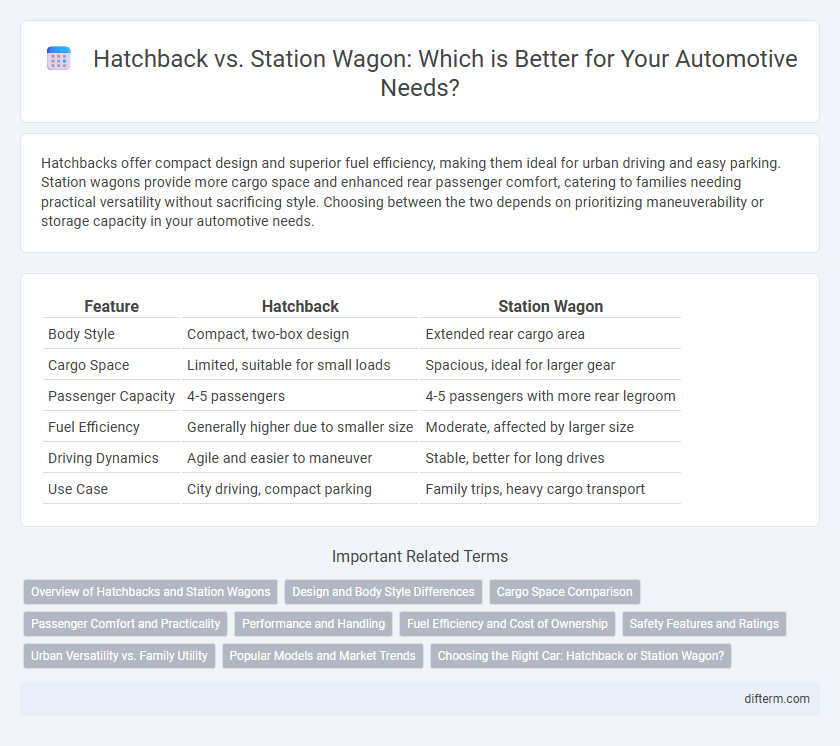Hatchbacks offer compact design and superior fuel efficiency, making them ideal for urban driving and easy parking. Station wagons provide more cargo space and enhanced rear passenger comfort, catering to families needing practical versatility without sacrificing style. Choosing between the two depends on prioritizing maneuverability or storage capacity in your automotive needs.
Table of Comparison
| Feature | Hatchback | Station Wagon |
|---|---|---|
| Body Style | Compact, two-box design | Extended rear cargo area |
| Cargo Space | Limited, suitable for small loads | Spacious, ideal for larger gear |
| Passenger Capacity | 4-5 passengers | 4-5 passengers with more rear legroom |
| Fuel Efficiency | Generally higher due to smaller size | Moderate, affected by larger size |
| Driving Dynamics | Agile and easier to maneuver | Stable, better for long drives |
| Use Case | City driving, compact parking | Family trips, heavy cargo transport |
Overview of Hatchbacks and Station Wagons
Hatchbacks offer a compact design with a rear door that swings upward, providing flexible cargo space and easy access to the trunk, ideal for urban driving and maneuverability. Station wagons feature an extended rear cargo area with a roofline that continues to the back, maximizing interior storage capacity while maintaining the driving dynamics of a sedan. Both body styles prioritize practicality, but hatchbacks excel in smaller dimensions and fuel efficiency, whereas station wagons appeal to consumers needing larger cargo volumes without switching to SUVs.
Design and Body Style Differences
Hatchbacks feature a compact, upright rear design with a rear door that swings upward, maximizing cargo space while maintaining a smaller footprint ideal for urban driving. Station wagons extend the roofline and rear cargo area, offering a longer, lower profile that provides increased storage capacity and versatility without the bulk of an SUV. Both body styles prioritize practicality, but hatchbacks emphasize agility and ease of parking, whereas station wagons deliver enhanced cargo volume and passenger comfort on longer trips.
Cargo Space Comparison
Hatchbacks offer versatile cargo space with rear seats that fold flat, maximizing volume in a compact design ideal for urban use. Station wagons provide significantly larger cargo capacity and a longer loading area, making them preferable for families or those needing to transport bulky items. Cargo space in station wagons can exceed 60 cubic feet with seats down, compared to hatchbacks which typically range between 20 to 40 cubic feet.
Passenger Comfort and Practicality
Hatchbacks provide compact dimensions ideal for city driving, featuring flexible rear seats that enhance passenger comfort and versatile cargo space for everyday needs. Station wagons offer increased interior room with extended cargo capacity, delivering superior legroom and headroom for passengers on long journeys. Both vehicle types prioritize practicality, but station wagons excel in accommodating larger families or bulky items without sacrificing ride comfort.
Performance and Handling
Hatchbacks typically offer a lighter chassis and more compact dimensions, resulting in agile handling and responsive steering, ideal for urban driving and tight corners. Station wagons, while heavier due to increased cargo capacity and extended wheelbase, provide enhanced stability and smoother ride comfort at higher speeds. Performance-wise, hatchbacks often feature sportier engine options delivering quicker acceleration, whereas station wagons emphasize torque and load-carrying capability without sacrificing overall driving dynamics.
Fuel Efficiency and Cost of Ownership
Hatchbacks typically offer better fuel efficiency due to their lighter weight and more compact design, resulting in lower fuel consumption compared to station wagons. The cost of ownership for hatchbacks is generally lower, with cheaper maintenance, insurance, and initial purchase prices contributing to overall savings. Station wagons, while offering more cargo space, often incur higher fuel costs and maintenance expenses, impacting long-term affordability.
Safety Features and Ratings
Hatchbacks generally offer compact designs with advanced active safety features such as automatic emergency braking and lane-keeping assist, contributing to high crash test ratings from organizations like IIHS and Euro NCAP. Station wagons provide enhanced structural rigidity and larger crumple zones, often resulting in superior side-impact and rollover protection scores. Both vehicle types increasingly incorporate driver-assistance systems, but wagons typically excel in overall safety due to their extended frame and increased weight.
Urban Versatility vs. Family Utility
Hatchbacks excel in urban versatility with their compact size, ease of parking, and agile maneuverability, making them ideal for city driving and tight spaces. Station wagons offer superior family utility through expansive cargo capacity, enhanced rear seat comfort, and practical roof rails for additional storage during road trips. Choosing between the two depends on prioritizing city-friendly design or ample space for family and luggage.
Popular Models and Market Trends
Popular hatchback models like the Volkswagen Golf and Ford Focus dominate urban markets with their compact size and fuel efficiency, appealing to younger buyers and city dwellers. Station wagons such as the Subaru Outback and Volvo V90 attract families and outdoor enthusiasts by offering increased cargo space and rugged versatility, maintaining steady demand in suburban areas. Market trends reveal a shift towards crossover SUVs, but hatchbacks and station wagons continue to hold niche markets driven by practicality and style preferences.
Choosing the Right Car: Hatchback or Station Wagon?
Hatchbacks offer compact dimensions and agile handling, ideal for city driving and easy parking, while station wagons provide increased cargo space and a more versatile rear area suited for families and long trips. Fuel efficiency tends to be higher in hatchbacks due to their lighter weight and smaller size, whereas station wagons often feature enhanced storage capacity without sacrificing passenger comfort. Consider your daily driving needs, cargo requirements, and parking convenience when selecting between a hatchback or station wagon to ensure optimal functionality and satisfaction.
hatchback vs station wagon Infographic

 difterm.com
difterm.com